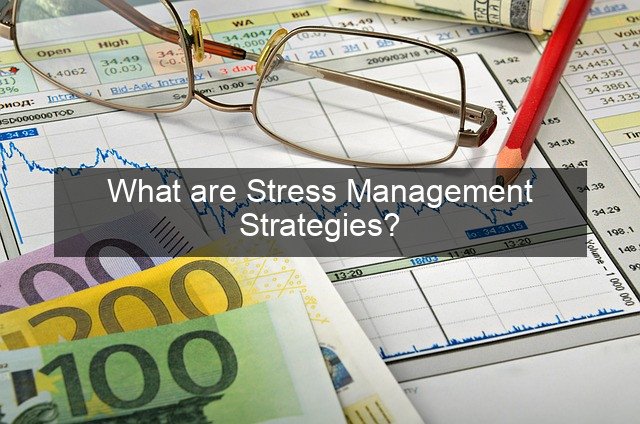What are Stress Management Strategies?

- What are Stress Management Strategies?
- Stress Management Strategies: A Comprehensive Guide
- Understanding Your Stress
- Identifying Your Stressors
- The Impact of Stress on Your Health
- Effective Stress Management Techniques
- Mindfulness and Meditation
- Relaxation Exercises
- Lifestyle Choices for Stress Reduction
- Healthy Diet and Exercise
- Time Management and Prioritization
- Social Support and Connection
- Creating a Personalized Stress Management Plan
- Conclusion

Stress Management Strategies: A Comprehensive Guide
Stress is an unavoidable part of modern life. From work deadlines to family responsibilities, daily pressures can take a toll on our physical and mental well-being. While a small amount of stress can be motivating, chronic stress can lead to serious health problems. Learning effective stress management strategies is crucial for navigating the challenges of life and maintaining a healthy, balanced lifestyle. This article will explore various techniques and approaches you can use to manage stress and improve your overall quality of life. We’ll delve into practical methods for coping with stress, from mindfulness and relaxation exercises to time management and healthy lifestyle choices. Understanding your stressors and developing personalized coping mechanisms is the key to effectively managing stress and reclaiming your inner peace.
Understanding Your Stress
Identifying Your Stressors
The first step in effective stress management is identifying your stressors. These are the specific situations, events, or thoughts that trigger your stress response. Common stressors include work pressure, financial difficulties, relationship problems, and major life changes. Keeping a stress journal can be a helpful tool for identifying patterns and triggers. Note down the date, time, situation, and your emotional and physical reactions. This can provide valuable insights into your personal stressors and help you develop targeted coping strategies.
Recognizing the signs of stress is also important. These can manifest physically, emotionally, and behaviorally. Physical symptoms might include headaches, muscle tension, fatigue, and digestive problems. Emotional signs can include irritability, anxiety, and difficulty concentrating. Behavioral symptoms might include changes in sleep patterns, appetite, and social withdrawal. Being aware of these signs can help you recognize when you’re experiencing stress and take steps to manage it.
Once you’ve identified your stressors and the signs of stress, you can start developing personalized coping mechanisms. These might include relaxation techniques, time management strategies, or lifestyle changes. The key is to find what works best for you and incorporate these strategies into your daily routine.
The Impact of Stress on Your Health
Chronic stress can have a significant impact on your physical and mental health. It can weaken your immune system, making you more susceptible to illness. Long-term stress can also increase your risk of developing chronic conditions such as heart disease, high blood pressure, and diabetes. Mentally, stress can contribute to anxiety, depression, and other mood disorders. It can also affect your cognitive function, impairing your memory and concentration.
Understanding the impact of stress on your health is crucial for motivating you to take action. Recognizing the potential consequences of unmanaged stress can empower you to prioritize your well-being and implement effective stress management strategies. By taking proactive steps to manage your stress, you can protect your health and improve your overall quality of life.
Stress can manifest in various ways, affecting different aspects of your life. It’s important to be mindful of these impacts and take steps to address them proactively. By understanding the connection between stress and health, you can empower yourself to take control of your well-being.
Effective Stress Management Techniques
Mindfulness and Meditation
Mindfulness and meditation are powerful tools for managing stress. Mindfulness involves paying attention to the present moment without judgment. It helps you become more aware of your thoughts, feelings, and bodily sensations, allowing you to observe them without getting carried away by them. Meditation is a practice that cultivates mindfulness. Regular meditation can help reduce stress, improve focus, and promote emotional regulation.
There are various types of meditation, including guided meditation, loving-kindness meditation, and walking meditation. Experiment with different techniques to find what resonates with you. Even a few minutes of daily meditation can make a significant difference in your stress levels. Start small and gradually increase the duration of your practice as you become more comfortable.
Incorporating mindfulness into your daily life can be as simple as paying attention to your breath, noticing the sensations of your feet on the ground, or savoring the taste of your food. These small acts of awareness can help you stay grounded in the present moment and reduce the impact of stressful thoughts and feelings.
Relaxation Exercises
Relaxation exercises are another effective way to manage stress. These techniques help calm your nervous system and reduce the physical symptoms of stress. Deep breathing exercises are a simple yet powerful way to relax your body and mind. Inhale deeply through your nose, hold for a few seconds, and exhale slowly through your mouth. Repeat this several times.
Progressive muscle relaxation involves tensing and relaxing different muscle groups in your body. This technique helps release muscle tension and promote relaxation. Yoga and tai chi are also excellent relaxation exercises that combine physical postures, breathing techniques, and meditation. These practices can improve flexibility, strength, and balance while reducing stress and promoting a sense of well-being.
Finding a relaxation technique that you enjoy and can incorporate into your routine is essential. Experiment with different methods and choose the ones that work best for you. Regular practice is key to experiencing the full benefits of relaxation exercises.
Lifestyle Choices for Stress Reduction
Healthy Diet and Exercise
A healthy diet and regular exercise play a crucial role in stress management. Nourishing your body with nutritious foods provides it with the resources it needs to cope with stress. A balanced diet rich in fruits, vegetables, whole grains, and lean protein can help stabilize your mood, boost your energy levels, and strengthen your immune system.
Regular physical activity is a powerful stress reliever. Exercise releases endorphins, which have mood-boosting effects. It also helps reduce muscle tension, improve sleep quality, and increase your overall sense of well-being. Aim for at least 30 minutes of moderate-intensity exercise most days of the week. Find activities you enjoy, such as walking, running, swimming, or dancing.
Making healthy lifestyle choices is an investment in your overall well-being. By prioritizing a healthy diet and regular exercise, you can build resilience to stress and improve your ability to cope with life’s challenges. These lifestyle changes can have a profound impact on both your physical and mental health.
Time Management and Prioritization
Effective time management and prioritization are essential for reducing stress. Feeling overwhelmed by responsibilities and deadlines can significantly contribute to stress levels. Learning to manage your time effectively can help you regain control over your schedule and reduce feelings of overwhelm.
Start by creating a to-do list and prioritizing tasks based on their importance and urgency. Break down large projects into smaller, more manageable steps. Learn to say no to commitments that you don’t have time for or that don’t align with your priorities. Delegate tasks whenever possible.
Effective time management is about working smarter, not harder. By prioritizing tasks, setting realistic deadlines, and utilizing time-saving techniques, you can reduce stress and increase productivity. This can create a sense of accomplishment and control, further reducing stress levels.
Social Support and Connection
Strong social connections are crucial for managing stress. Connecting with supportive friends, family members, or colleagues can provide a sense of belonging and reduce feelings of isolation. Talking about your stressors with someone you trust can help you process your emotions and gain new perspectives.
Joining a support group or engaging in social activities can also be beneficial. Connecting with others who share similar experiences can provide a sense of community and support. Building strong social connections is an investment in your mental and emotional well-being.
Nurturing your relationships and seeking social support can help you navigate stressful times with greater ease. Remember that you don’t have to go through challenges alone. Reaching out to others can provide comfort, encouragement, and practical support.
Creating a Personalized Stress Management Plan
| Technique | Description |
|---|---|
| Deep Breathing | Inhale deeply, hold, and exhale slowly. |
| Progressive Muscle Relaxation | Tense and relax different muscle groups. |
| Mindfulness Meditation | Focus on the present moment without judgment. |
- Identify your stressors.
- Practice relaxation techniques.
- Prioritize a healthy lifestyle.
Conclusion
Managing stress effectively is a journey, not a destination. It requires ongoing effort and a willingness to experiment with different techniques. By incorporating the strategies discussed in this article into your daily life, you can develop resilience to stress and improve your overall well-being. Remember that finding what works best for you is key to creating a sustainable stress management plan. Prioritizing your mental and physical health is an investment in a happier, more fulfilling life.
What are the most common signs of stress?

